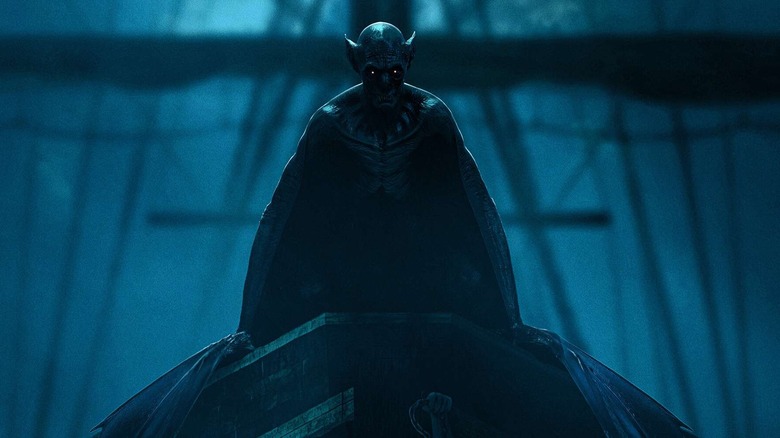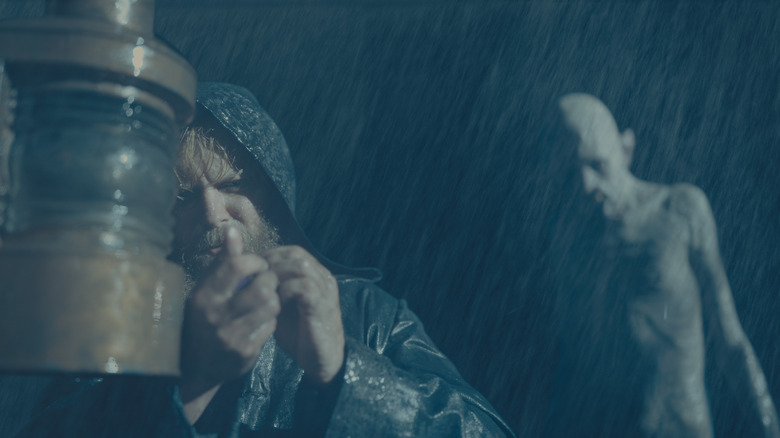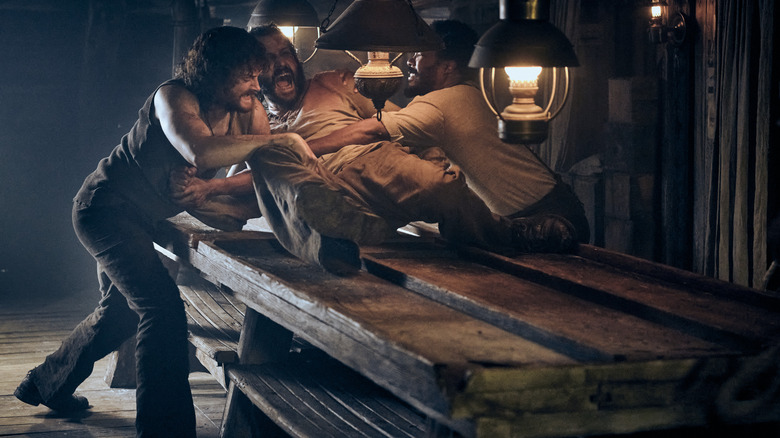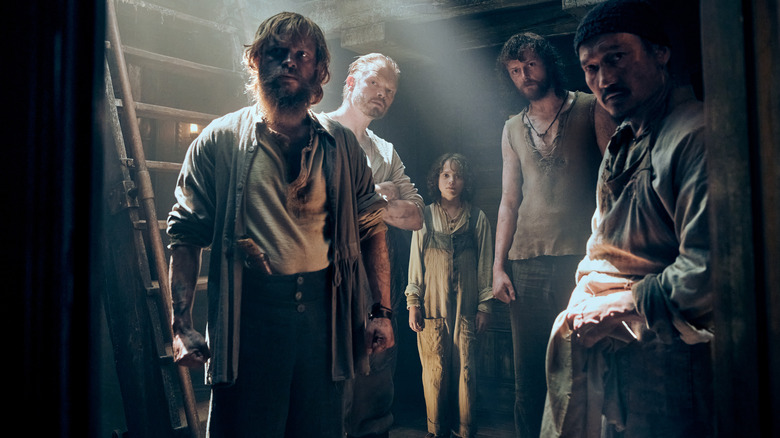The Last Voyage Of The Demeter Asks: 'What If Dracula Was An Alien Movie?'
Warning: This article contains all sorts of bloody spoilers for "The Last Voyage of the Demeter."
A hardworking crew of blue-collar, no-nonsense grunts boards a ship taking them across a vast ocean of unforgiving environments, eager to reach their final destination to cash their paychecks and do it all over again. It's an abundantly simple life and an inordinately punishing job, but someone has to do it. Unknown to any of them, however, they're also carrying a bloodthirsty stowaway on board — the likes of which these gruff, weathered veterans have never encountered before.
Countless movies and shows have taken the building blocks set down by Ridley Scott's "Alien" to heart, the legendary horror movie that forever established the mold for imitators to try their best to recreate. Even some of the biggest blockbuster franchises in the world have followed in the 1979 classic's footsteps, like when "Star Wars" channeled its inner Xenomorph in that one episode of "The Mandalorian" or, more recently, when "Star Trek" took things even further in "Strange New Worlds" with the Gorn. Those examples make perfect sense as fellow sci-fi stories set in space, despite their wildly different tones and target demographics, but what madman would apply such creative inspiration to a gothic horror movie featuring the most famous of all monsters, Dracula?
That's the inventive approach that Norwegian filmmaker André Øvredal and writers Bragi F. Schut and Zak Olkewicz took for "The Last Voyage of the Demeter," an adaptation based on a single chapter of the original Bram Stoker novel. From setting the story in the confines of a single ship, to getting audiences invested in each crew member before brutally killing them off one by one, to turning Dracula into the embodiment of fear itself, "Demeter" cribs "Alien" in all the best ways.
Monster in their midst
"Alien" and "The Last Voyage of the Demeter" share similar DNA in more ways than one. Ridley Scott and writer Dan O'Bannon hardly invented the concept of using an original monster to reflect very specific fears and themes but, in reality, Bram Stoker couldn't even claim that honor with his 1897 novel — not when Mary Shelley beat him to the punch almost 80 years prior with "Frankenstein." Yet that's precisely the point, isn't it? Who's to say where inspiration begins and our collective unconscious ends? For eons, humanity has attempted to filter our worst nightmares into a strange and exaggerated "other," an avatar capable of funneling our basest tendencies and most frightening potential into the form of one hideous being. "The Last Voyage of the Demeter" carries on that proud tradition, fittingly enough, by looking back at the past.
Nowhere is that more overt than the way the fearsome vampire in "Demeter" echoes the Xenomorph in "Alien." Constantly hidden in the shadows and content to toy with his victims before taking them down, it's impossible to watch Dracula wreak havoc on the main deck of the Demeter and in the claustrophobic cabins below without becoming reminded of the blood-splattered walls of the Nostromo. The reconceptualization of Dracula into an animalistic creature driven by an instinctual need for blood is certainly a far cry from the more elegant and refined version that the Bela Lugosi-starring movie almost singlehandedly popularized, but this isn't merely an aesthetic choice.
Dracula and the eponymous alien represent something altogether more frightening than that. In both films, the relentless monsters represent the unknown and the inexplicable; a perversion of nature itself. They evoke the idea of lust, sexual and otherwise. But more than anything else, they're reminders that evil comes from within.
The wages of sin
Is it any surprise that horror and religion tend to go hand in hand? When confronted by forces of power far beyond our understanding, where else are people supposed to turn to besides the supernatural? While "Alien" doesn't include many overt references to God beyond the almost demonic Xenomorph itself (Ridley Scott eventually got that out of his system with "Prometheus" and "Alien: Covenant"), "The Last Voyage of the Demeter" certainly takes its cues from the original text and draws distinct parallels between Dracula and faith.
The mere sight of Dracula's dragon emblem, emblazoned on crates loaded onto the Demeter while still at port, provokes pale-faced locals to make the sign of the cross and renege on embarking on the voyage. Early on, the ship's cook Joseph (Jon Jon Briones) parades his Christian faith and scolds newcomer and main character Clemens (Corey Hawkins) that no man who takes the Lord's name in vain can expect to be served in his kitchen. And by the time Dracula has made his presence known and feasted on the blood of multiple deckhands, even the rest of the "heathen" crew start to believe that God has utterly forsaken them and set a punishing devil upon them.
It's no wonder, then, that "Demeter" goes so far as to stage its own twisted take on the iconic chest-burster scene, when rugged ship's mate Olgaren (Stefan Kapicic) ends up bitten by Dracula but otherwise left alive (or, rather, undead). Strapped down onto wooden boards and clearly in agony over the festering bite wound on his neck, his eventual transformation into an unthinking monster in his own right might as well take the form of an exorcism ... or the birth of a Xenomorph, literalizing the idea of our sins coming to roost.
But at what cost?
Lust, avarice, vanity — if multiple characters display any of these qualities in a horror movie, they'll receive their cosmic comeuppance by the time the credits roll. But stories like "Alien" and "The Last Voyage of the Demeter" differ from the usual justice doled out by a cruel and unfeeling universe in other films thanks to the true motivations of their respective characters. It's hard not to notice the similarities between the crew of both movies: hardworking, down-to-earth civilians who only ever want to roll up their sleeves, get to work, and earn their pay by the end of their journey. In fact, "Demeter" even includes a very notable moment where Captain Eliot (Liam Cunningham) joins his men for dinner and asks what each of them will do with the bonus wages earned by delivering their cargo to London as efficiently as possible.
If that sounds eerily similar to the famous breakfast scene where the working-class crew of the Nostromo talks about much the same thing, I'd wager that was hardly by accident.
But even if the downfall of both crews wasn't caused by material greed, it's telling that each film goes out of its way to depict the moment of no return — when they decide to press on and fly in the face of caution — as a result of the need to make a living. Although no sinister corporation like Weyland-Yutani looms over the heads of the Demeter, it's clear that similar systemic forces drive them to their breaking points ... even before Dracula makes that literal. Tragically, these pour souls were doomed the moment they stepped on board; victims of capitalism just as much as the monsters they brought with them.
"The Last Voyage of the Demeter" is now playing in theaters.



